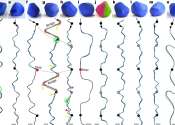Using a quantum-like model to enable perception in robots with limited sensing capabilities
Over the past few years, researchers have been trying to apply quantum physics theory to a variety of fields, including robotics, biology and cognitive science. Computational techniques that draw inspiration from quantum ...









